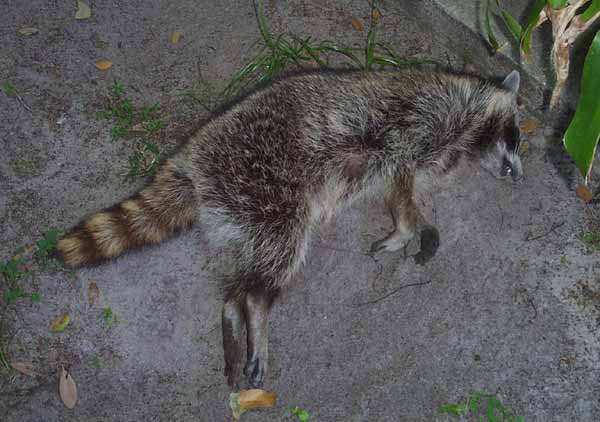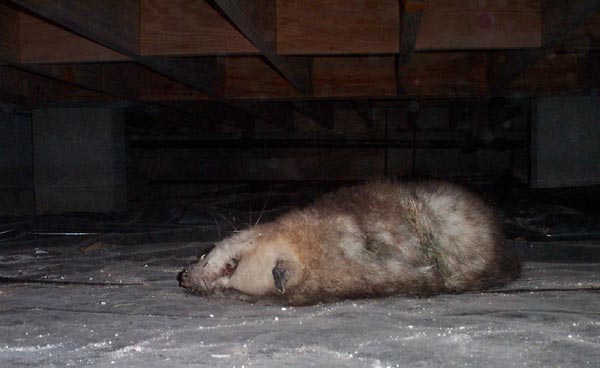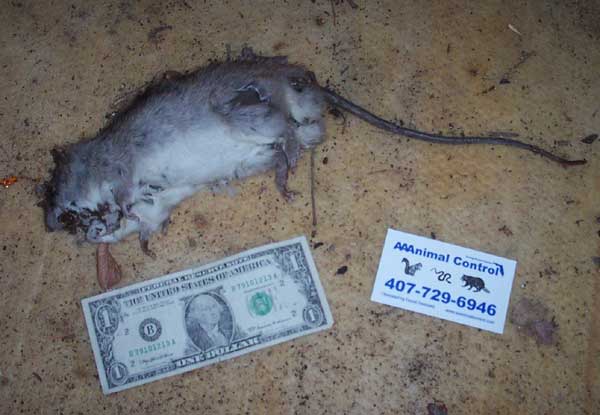Death is a part of the natural cycle. Unfortunately for the homeowner, it can happen on private property, or even inside the house itself.
Animals can die in the yard, on the driveway, on the roof, behind the shed, etc. or worse, under a deck, under a crawl space, or worse yet,
inside an attic or the walls of the house.
If an animal is found dead outside, it should be examined for signs of sickness and properly
removed and disposed of. If left unremoved, the decay process will begin, complete with an infestation of maggots, and the stench will
be unpleasant (not to mention the attraction of vermin and disease). If an animal is within a structure, the problem is worse, because the
stench will gather within the home. I deal with several cases each month in which homeowners have abandoned their homes (or certain rooms
of their homes) due to the odor.
Please click here to see my
How To Get a Dead Animal Out of the Attic page, to see what I do.
Click the below photographs for examples of dead animal removal jobs I've done:
It takes an experienced professional to find and remove the carcass. A dead animal in an attic can be
very difficult to locate, especially if it's a rat that has died underneath insulation. An animal in a wall is very challenging. I have to
sniff like a bloodhound, then drill small "sniff holes" in the walls between studs to narrow down the spot, and cut a hole to remove the
carcass. It's not a pleasant job. While sniffing in attics, I can't wear my respirator (I need my full sense of smell), and expose myself to the hazards of excessive dust and fiberglass inhalation. Crawling under a home
can be dangerous and unpleasant. I've crawled out from under a dark, confined, dirty crawlspace with a dead animal, only to find myself
covered with hundreds of fleas. Nevertheless, dead animal removal is a necessary service, and few jobs leave customers more grateful.
After the animal is removed, the majority of the odor will soon disappear. Once the source is gone, that's 95% of the job right there. Just open up some windows and give
it a little time, and the odor will be gone. However, in some cases, fluids and juices from the rotting carcass will have seeped into attic insulation, or into drywall.
In this case, you will need more advanced cleanup to remove the smell. Click my
How to Get Rid of Dead Animal Smell page for advanced
tactics to eliminate the lingering odor entirely after dead animal removal.
 Luckily, this raccoon died in an easy to reach place.
Luckily, this raccoon died in an easy to reach place.

This opossum died under a home, causing a strong stench within.

Can one giant rat in the ceiling really smell bad? Just ask the employees who refused
to work there. (That's my old business card).
Click these links to see why I'm the best dead animal specialist in town!
I personally live in Orlando FL, where I perform my dead animal removal services. I have done several hundred dead animal carcass extractions from houses, under houses, in attics, and in walls. Removals outside are very easy and
straightforward. But a
Dead Animal in House is a whole different matter. It can be very challenging to find. In my first couple of years, it took me
a long time to find some of the animals, often over two hours of very difficult searching. But I got better and better, and now I can usually find them in under fifteen minutes! Give me a call for dead animal removal Orlando FL, or
call my friends in all other US cities if you need help in your area.

If you don't live in Orlando FL, click here for the
National Directory of Wildlife Trappers.
Our friends service several areas. Click these areas for more information:
Atlanta Animal Control -
Augusta Animal Control -
Savannah Animal Control -
Birmingham Animal Control -
Raleigh Animal Control -
Sarasota Animal Control -
Greenville Animal Control -
Columbia Animal Control -
Lexington County Animal Control -
Sumter County Animal Control -
Spartanburg Animal Control -
Lawrenceville Animal Control -
Decatur Animal Control -
Marietta Animal Control -
Alpharetta Animal Control
Dead animals can be of any species and can have negative effects on other animals or even humans. There are diseases that can be spread by them because of forming bacteria, or because of the cause of death. If a cause of death is not obvious, or it is a part of a trend amongst animal deaths it is prudent to have a professional determine the cause of death to make sure it is nothing that can spread to other creatures.
Diseases
There are diseases that can affect an animal or several of them. If an animal has died of trauma then the chances of it representing a health risk are minimal, but if it has died of a specific disease and other animals eat it then there is a chance that they will get the disease as well. The best example of this is rabies. The rabies virus will usually die a few hours after the animal dies when in warm temperatures, but in freezing weather it can remain alive for months. If an animal were to have an open wound or chew on the carcass of another animal that died of rabies it can be infected with the virus.
The rabies virus is not the only concern. The CDC will investigate the mass deaths of many animals in order to determine if they present a risk to public health. Avian flu has not hit the North American continent yet, but it has the potential to be spread between birds as it has done in Asia in the past. These kinds of outbreak can have a negative impact on the environment as well as on poultry industry.
Death By Trauma
When an animal has died by trauma the chances of it becoming a health threat are significantly less, but it is not without its risks. A dead animal on the water supply for example can spread harmful bacteria to the water supply system. That can result in a significant hit on the resources of a state or county. No real threat has been found from burying a body, but it is suggested that the body of a dead animal be buried away from water supply sites especially under-ground reservoirs.
Other Potential Hazards
Dead animals also present other potential hazards. For example an accident could be caused by a dead animal on a road. These hazards can of course be reduced by contacting an animal removal service or your local town. The town may have a removal service to have the carcass disposed. It is not suggested that you remove the animal yourself even if you are certain of the reason an animal died. Even if an animal has died of trauma it does not mean that it was not sick in the first place. We should go back to the rabies example; an animal with rabies will start acting differently; if it is a night time animal it will start being active during the day. If that animal died of trauma and you were to remove it yourself you can be exposed to the rabies virus which is fatal.
Other Annoyances
The slightly less hazardous annoyances include the smell that a dead animal can spread. The smell can be strong and make it extremely uncomfortable to be anywhere near it. If you have a dead animal and the smell is the biggest problem you can contact a professional animal removal company. This is the most prudent way to get rid of the carcass while keeping yourself and your family safe. A professional will know the precautions to take and how to best dispose of the animal.